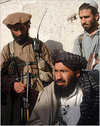Two major Pakistani Taliban groups based in Waziristan that have feuded in the past have put aside differences and formed an alliance.
The North Waziristan faction, led by Hafiz Gul Bahadar, and the South Waziristan faction, led by Mullah Nazir, have agreed to put an end to a local feud with Baitullah Mehsud, the overall leader of the Pakistani Taliban. The three groups have joined forces to prevent outside enemies from dividing the Taliban, the BBC reported.
The three leaders met at an undisclosed location in the Waziristan region. The Taliban warlords agreed to form a 13-man shura, or council. Leadership of the shura would rotate and Baitullah, Nazir, and Bahadar will all sit on the council.
It is unclear if Nazir and Bahadar will join Baitullah Tehrik-e-Taliban, or the Movement of the Taliban in Pakistan. Baitullah’s group, which operates in all of the tribal areas and throughout the Northwest Frontier Province, has defeated the Pakistani military in multiple battles, forcing the government to cut peace agreements.
The move to unite the Waziristan factions comes as the Taliban achieved its greatest victory yet by humiliating government forces in Swat and forcing the state to cede a vast region in the Northwest Frontier Province. Mullah Fazlullah, the second in command of the Tehrik-e-Taliban, has led the fighting in Swat.
|
|
|
Baitullah Mehsud from a recent Taliban video. |
The prior rivalry between Baitullah on one side and Nazir and Bahadar on the other led to small scale clashes between the groups. Last summer, Nazir and Bahadar formed an alliance to resist Baitullah’s expansion in the tribal areas.
Aside from tribal rivalries and disputes over land, the two sides disagreed over the issue of fighting the Pakistani state. Baitullah aims to conquer territory by fighting the military, while Nazir and Bahadar want to focus efforts across the border in Afghanistan. This led some analysts to improperly label the two “pro-government Taliban.”
The new alliance will strengthen the Taliban throughout the tribal areas. The differences prevented the groups from pooling their forces to battle Pakistani government forces during past engagements in the Waziristan region.
Baitullah, Nazir, and Bahadar all sponsor al Qaeda and other Pakistani jihadi groups. Their tribal areas are a safe haven for al Qaeda, which numerous camps and safe houses in the region. US Predator strikes have hit al Qaeda and Taliban compounds, safe houses, and camps in all three Taliban leader’s territory.










4 Comments
All 3 of those guys were on the same room together!!!!!!! Where is a Hellfire or JDAM when you need one. It really is a shame the CIA missed out on that intel.
It’s my belief that a significant amount of the conflict inside Afghanistan is with Pakistani elements infiltrating from the NWFP. Can anyone comment on this contension.
These guys will be at each other’s throats again. The US has to pick up the pace with the airstrikes, and when good intel comes in-act. Iam sure there are eyes on certain places where these guys feel safe.
Whisperer you say:
“These Taliban have long histories of plotting against each other as well as against other Muslims. Similar to elements in India, these Taliban also seem to be natural enemies of Pakistan. There is no difference in the things they plot against the Pakistanis. The only difference is in the excuses they use.”
So, what is that “elements in India” bit about there? Are we playing the “pakistan-is-a-victim” card again? Keeping in mind, that the Pakistani Taliban comprises essentially of Pakistanis, is indigenous and not an import, physically or ideologically. Just clarifying…
I agree with your thoughts about marriages of convenience, the cult of violence and the exploitation of common folk amongst the tribesmen who struggle for food and shelter and where security is a nightmare rather than a dream.
I wonder if the Waziristan Taliban is not responding to an impetus from having seen the State’s weakness in Swat and with the smell of blood, realising the power of unity when the enemy is on the backfoot, and i daresay divided (Govt/Army…PM/President???…and so on…with the ISI being more than just a joker in the pack).
The Taliban juggernaut seems to be moving faster than one might’ve thought of a few weeks ago?
To NATEJ i would say, the good news is now that they have the shura council, hopefully they will get together more frequently and now hellfire can get the whole dirty dozen, or so.